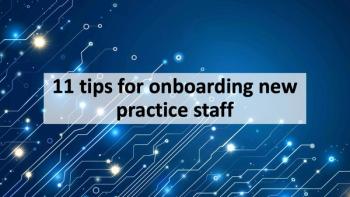
Physicians Desire Focused Communication Over MOC
Physicians are not certain what message the certification boards are trying to send about MOC. Transparency would be a good place to start.
I've been intrigued as I've watched what seems to be constant changes in the various requirements for my physician maintenance of certification (MOC). I know for my specialty board the requirements have changed at least three times during the 10 years I have worked on my second round of certification. I thought I would share a few lessons I've taken away from this experience.
1. Be focused in your message
I'm not real certain what message the boards are trying to send to their members. At no time when I received communication from my board did I hear "We are doing this for you and your patients." Instead I got a constant thread of changing requirements which seemed to come with a new and higher fee. I was told that it's important for me to comply and participate in this voluntary process. My participation will ensure that I work to keep healthcare costs down and provide quality patient care because they are forcing me to keep up to date with the latest treatments. I consider myself a life-long learner, and I enjoy keeping abreast of the most recent findings. It's the reason I go to meetings and read journals. The message physicians hear from the board seems to be very different from its stated mission and purpose.
Lesson: When you talk with your people, be focused in your message. Start with your mission and purpose - the "what" and "why" you do what you do. Tie everything to that. Try saying "We are doing 'A' because it supports our mission and it does so by…" Don't assume that everyone knows your mission and purpose. Each time you communicate with your people, repeat the mission and purpose, especially if the communication is about something new or a big change. If they have understood and accepted your mission and purpose, they are more apt to accept the changes you will want to implement.
2. Be fair
Any time you show differential treatment to one group over another, you're bound to generate resentment and hostility toward yourself. That is what happened with some boards. There exists a certain population of practitioners who have been exempted from the time-limited board process. It's as if their knowledge doesn't get old and stale. Maybe it's just that their residency training was far superior to mine. I honestly don't know the reason for the decision. It has never been articulated. At no time was an explanation for the differential treatment given.
Lesson: When dealing with employees and those you work with, be fair with everyone. Avoid showing preferential treatment if possible, unless it is deserved. Be open, honest, and transparent with your people. If you have a legitimate reason to give something to a specific group or person, be willing to justify it with data. If you can't, then perhaps you shouldn't do it.
3. Be honest and transparent
Most people are good at detecting lies. We don't lie as well as we think we do. We have tells, tics, statements, and conflicting body language that we simply aren't aware of. If we lie, someone, somewhere will be able to tell if we're hiding something. Avoid conflicts of interest or even the perception of a conflict of interest. It is one thing to be rewarded for your hard work and effort. It's another to simply use or abuse your position of power and influence for your benefit alone.
Lesson: If you're leading a team or group, don't try and hide the special deals you are receiving or giving. If you deserve the reward for work, most people will actually be OK with it. It's when you hide things or bend the truth about the special deal that people get upset. Here's a good test to see if what you're doing is appropriate. I call it the "kindergarten test." If you wouldn't want your kindergartener to know about what you have done, or are doing, then perhaps you shouldn't do it. If you can't explain the logic behind the rationale for your actions, then perhaps it's time to reexamine the special deal.
I think MOC has good intentions, but the way in which it has been carried out - the poor communication and leadership - has led to the uproar and backlash we are currently witnessing. When you're leading change in your organization, remember to be focused, fair, honest, and transparent in your change management. You'll go farther faster and get greater buy-in by those you're leading.
David J. Norris, MD, MBA, CPE, is an anesthesiologist at Wichita Anesthesiology Chartered in Wichita, Kan., the owner of the Center for Professional Business Development, which aids and educates physicians and other small business owners, as well as a member of the Physicians Practice Advisory Board.
Newsletter
Optimize your practice with the Physicians Practice newsletter, offering management pearls, leadership tips, and business strategies tailored for practice administrators and physicians of any specialty.









